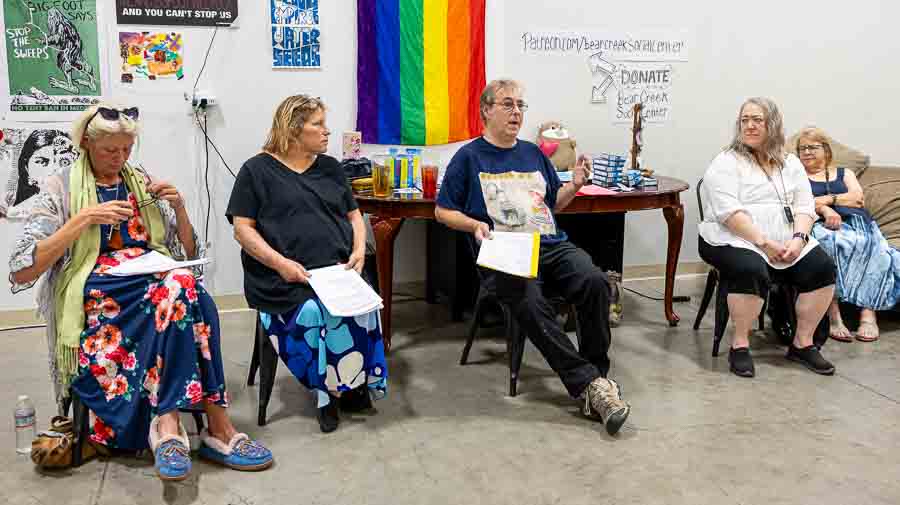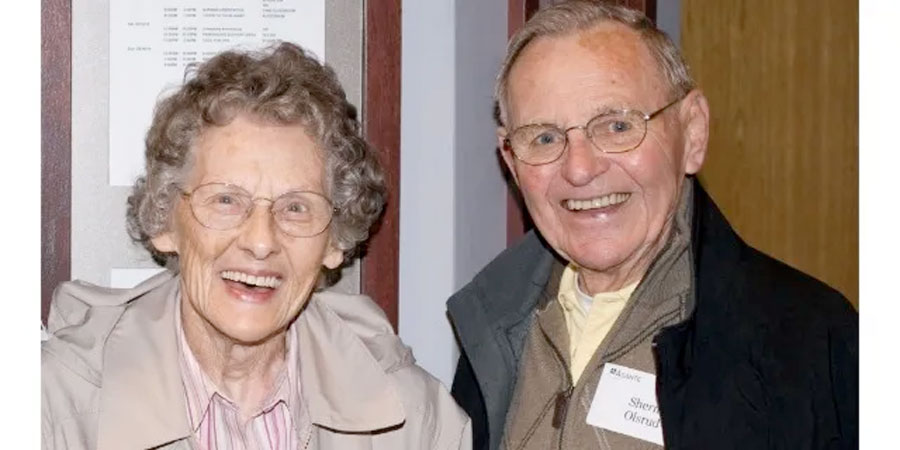Southern Oregon Jobs with Justice holds third de-escalation workshop, will facilitate workshops for anyone interested
By Sydney Seymour, Ashland.news
Just over a dozen community members, volunteers and those with lived experience of homelessness gathered at the Bear Creek Social Center in Talent for a 90-minute workshop and open discussion on de-escalation, trauma and homelessness on Wednesday, Sept. 24.
For the third de-escalation workshop facilitated by nonprofit Southern Oregon Jobs with Justice, organizer Jason Houk said they wanted to connect with the new social center that moved to Talent over the summer because it “brings together a lot of different groups,” Houk said.
Individuals from across the Rogue Valley — the Ashland Lions Club, Medford Stabbin’ Wagon, Hawthorne Park Potluck, Yreka Food Bank and more — joined Houk, who spends his Thursdays and Fridays serving free cooked meals in Ashland through Community Peace Meals.

The workshop “gives people skills to better communicate with folks in a vulnerable community, encourages people to treat each other more like humans and helps people understand that we’re all in this together,” Houk said.
Houk led the workshop with help from Jeannie Martins, a mother of four who experienced homelessness for about 10 years — seven without shelter. She said to the group, “I was a trophy wife, but trophies get rusty.”
After a year-and-a-half-long waitlist and stay at Ashland’s dusk-to-dawn camping area, Martins told Ashland.news she moved into the city’s OHRA — Opportunities for Housing, Resources & Assistance — Center in June.
How trauma affects the brain and behaviors
Houk explained how trauma affects the brain’s amygdala, which controls the fight-or-flight response, and explained how those experiencing homelessness may be living in constant fight-or-flight mode.
”That guard dog is always on duty,” he said. “People get hyperaroused, misperceive threats and even shut down due to the inconsistency and mistrust they’ve experienced.”

Martins described the trauma shutdown response as a “wall of awful.”

Martins continued. “A huge wall builds up where you can’t even move. The only way you know to get through it is hulk smash,” she continued, pointing to potential anger and violence that might follow.
But, she said, “you can flip it around if you show them you’re not a threat,” advising the group to always lead with compassion in a de-escalation.
“Make sure they don’t leave thinking no one cares. You don’t know how close they are to giving up,” Martins said. Sometimes offering a cigarette helps, she continued, but other times “all it takes is the squishy part of a brownie” to make someone feel better.
How to de-escalate
The two main reasons for an escalation, Houk said, are danger and disrespect. The two antidotes to conflict are offering safety and respect.
Houk said to always ask another volunteer, employee or trusted adult for help and let someone lead in a de-esclation rather than interfering. If the aggravated person has a trusted individual, bring them in, Martins advised.
The first five seconds of an escalation are essential, according to Houk. As people get more agitated, it takes longer to calm them down. He said to smile, introduce yourself, ask their name and repeat back what people said to show active listening and confirm what you heard.
To make decisions in a “rational mind” and “be more in tune with your body,” Houk advised the group to breathe in a de-escalation. The group practiced the box-breathing — four seconds of inhale and four seconds of exhale — which controls adrenaline and heart rate.

Since the amygdala is also always watching for nonverbal communication in a conflict, Houk said to portray respect and sadness with body language and tone of voice. He suggested speaking at 25% lower than what they want someone else to speak and 3.3 seconds of eye contact.
Martins referenced “method acting,” recommending people use their own experiences to empathize with what it’s like to be in crisis. This technique can be used when enforcing rules, which Martins said is always important to do with “compassion and consistency.”
The deets
To have Southern Oregon Jobs with Justice facilitate a 90-minute de-escalation workshop and discussion, call organizer Jason Houk at 541-841-8341.
Giving as an example a volunteer providing inaccurate opening food bank hours to someone facing homelessness, Martins said, “It makes it so the only stable thing is unstable.”
Building trust and relationships with individuals could also prevent conflict, Houk said. “Meeting people where they are, complimenting them and doing deeds for them can make all the difference.”
While camaraderie and even making someone laugh can be key, Martins said, “the best thing in the whole wide world is remembering them and what they told you about themselves.”
Workshop for the wider community
The workshop “is not specific to the homeless or social services,” Houk said. “It’s for anyone that wants to feel confident in de-escalating.”
Those prone to interacting with escalations — not only with the homeless — also joined the workshop, including a jail nurse and Lisa Lineberger, who works with children with autism.
Coming from Eagle Point, Lineberger, who also volunteers at the Hawthorne Park Potluck, has experienced a few escalations. She said, “As a survivor of domestic violence, I’m always the one who says that you can walk and talk yourself through any problems. Never come to fists.”
Lineberger told Ashland.news she agreed with a lot of what Houk had to say, like “safety hands,” which means keeping arms below the waist, behind the back or in pockets during a de-escalation.
“The main reason people don’t engage in conflict resolution and de-escalation is because they don’t know how to do it,” Houk said.
He hopes to offer this training to “anyone who would be interested in receiving it,” perhaps business owners, library workers and nonprofit staffers. Houk continued, “This training has been so useful for ourselves and our volunteers that there’s a real place where it could help a wider community.”
Email Ashland.news Snowden reporting intern Sydney Seymour at [email protected].

















